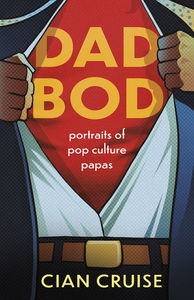For Father's Day, Read an Excerpt from Dad Bod: Portraits of Pop Culture Papas by Cian Cruise
From Mommy Dearest and Psycho to Sally Field's saintly mother in Forrest Gump and Terminator's Sarah Connor, moms and their impact hold a lot of storytelling significance in our culture. But what about the dads of film, TV, and video games? Their stories may not pop as easily into our heads, but when we scratch the surface, dads, and their place in our stories, are fascinating figures.
Enter the newest title from Dundurn Press's Rare Machines imprint, Dad Bod: Portraits of Pop Culture Papas by Cian Cruise. Cruise, who has written cultural commentary and criticism for Vulture, Playboy, Hazlitt, and more, brings his insight and wit to bear on the father figure on our screens, from Homer Simpson to Die Hard's John McClane, amongst many other familiar faces.
A new dad himself, Cruise explores what "our" dads say about us, about gender, about family, and about society. Wise, funny, and sharp, Dad Bod is not only a perfect gift book for the dad in your life as Father's Day rolls around (this weekend, for those who observe), it's also a universally interesting exploration of how the father role has evolved in culture over time.
Courtesy of Dundurn Press, we're sharing an exclusive excerpt from Dad Bod today. Here we step into Cruise's essay "404 Dad Not Found" at his third point in the piece, which deals with how infrequently we see pop culture portrayals of men supporting their pregnant partners. Delving into empathy, stereotypes, and frustratingly rigid cultural and gender roles, "404 Dad Not Found", like the whole of Cruise's book, pokes light-heartedly but fearlessly at the contradictions and oddities we ascribe to our on-screen dads.
Excerpt from Dad Bod: Portraits of Pop Culture Papas
404 Dad Not Found
3. Men aren’t “naturally” capable of parenting.
This is pernicious as all get-out. Even in an ostensibly — what’s three notches down from “woke”? Not quite progressive. Maybe paper-tiger progressive? Centrist? Wait, now I’ve got it: even in an ostensibly “modern” romantic comedy featuring pregnancy, What to Expect When You’re Expecting, the assumption is that men start from a disadvantage when it comes to child-rearing compared to women — a natural, inborn dis- advantage — which is centre ring in the whole problem-circus that I’m wrangling here.
There’s an unspoken assumption riven throughout our culture that men don’t or shouldn’t care about babies, or about the act of caregiving. Plenty of men do anyway, but supposedly they’re few and far between.
So when a movie comes along like What to Expect, (1) which you can tell is kind of trying to mildly upend some stereotypes of masculine care, but in order to do so, has to first pander to those stereotypes so as not to alienate the target audience, it gets awful weird awful fast and — even worse — I would say it gets mired in that initial assumption set and holds fast. In part that’s because of the preceding two points. The movie still has to be “about” the man’s journey, rather than the complex of a newly forming family, (2) and the pregnancy must still be dramatically coded as an imposition.
What’s worse, the film is five vignettes about pregnancy shoved into a phone booth, giving none of them the opportunity to delve deeper than a pamphlet.
In the main plotline, instead of an executive badass lady becoming un-jaded, now the imposition is “This guy needs to be taught what fatherhood is really all about” (by Chris Rock, I guess, and some other “regular guys” (3) from a token-filled group of market-research demography), because this pregnancy imposition is happening to him.
Your CanLit News
Subscribe to Open Book’s newsletter to get local book events, literary content, writing tips, and more in your inbox
Throughout, we learn that it is okay to buy a lot of child-rearing paraphernalia, and that you can still “be a real man” based on your previous straw-thin definition and have a baby around but not, really, take care of it in any tangible way. The idea here is that these guys are advanced because they are willing to spend time being seen in public with their babies. This is like a guy who expects a standing ovation for deigning to do the dishes. They high-five about low expectations and a lack of judgment upon one another’s fundamental discomfort and awkwardness around children, revealing that the way forward is, basically, a kind of neutered apathy that is considered a vast improvement over top of the initial starting place of emotional, logistical, and domestic incompetence.
It honestly feels like the script was written by the kind of guy who gets the heebie-jeebies by accidentally walking into the women’s section of a department store.
As always, the book is better than the movie.
•
Okay, so all roads lead to sexism, after all. I should’ve listened to the women in my life, once again. How has there been so little progress in such a long amount of time? What are the mechanics of this assumption-laden fantasy of ignoramus fathers, that gets men off the hook from continuing to develop as people past the age of eighteen?
For that, I’m going to have to turn to Ted Danson, as I often do in times of duress.
•
Three Men and a Baby plays off the exact same comedic stereo- types of What to Expect, and the movie was released in 1987. That’s a twenty-five-year gap. It’s the kind of movie I might’ve seen when I was a kid, and only half-understood what was going on as I peered between my parents’ knees on a Sunday afternoon, face hidden behind a pillow when they told me a “grown-up” scene was coming.
For a quick refresher, Three Men is about three eligible bachelors, played by Ted Danson, Tom Selleck, and Steve Guttenberg, and directed by Spock, (4) of all people. One day, a baby shows up on their doorstep, product of a tryst one of them had. They are utterly incompetent caregivers, but they fall in love with the child while simultaneously dealing with some heroin dealers, because you’ve gotta have a plot. Their landlady teaches them how to take care of the baby, and eventually the baby’s mother shows up to first fight, then join them.
The three key stereotypes about babies and men are right there: the men are the main characters, the baby’s a narrative imposition, and guys are naturally hopeless when it comes to care.
In two and a half decades, the needle of basic cultural assumptions about masculinity and child-rearing from Three Men and a Baby to What to Expect When You’re Expecting moved exactly bupkis.
The value of looking at Three Men is that it shows us how men get off the hook: we tend to judge men as we would boys. Never mind the fact that these characters are professionals (an actor, an architect, and a cartoonist), they are boys, living in a kind of super-clubhouse apartment complex. Their main concern at the beginning of the film is partying.
Period. Tom Selleck was forty-two when this flick came out, and we’re led to believe that his character wanted nothing more but a carefree life of booze, babes, and bacon. Have you ever met a forty-two-year-old architect? All the ones I know fall straight into the category of board-game players, if you catch my drift. Catan and seltzer on a Wednesday night, not rum and Coke.
•
Anyway, the initial disparity is clear — guys don’t know shit about being parents. The thing is, nobody does. This crazy assumption that somehow women have an inborn talent for nurturing is the boldest slice of propaganda since Mao’s Five- Year Plan. They learn it. They bother to pay attention. They don’t have a choice, you see, because the baby is there, as raw a reality as you can muster, and they just have to figure it out (given that the men in our culture have convinced them- selves that they can’t even learn — inborn, innit? — and convinced everyone else that they don’t have to — thanks, patriarchy!). If the women hadn’t stepped up to the plate for the past few thousand years, we’d be doing a hell of a lot worse as a species.
And, because these cockamamie assumptions make it so difficult to make material contrary to the market research of Hollywood’s overseers, we’re all so much more impoverished and misaligned.
Pregnancy happens offstage. Men become dads with no ritual or education. Then they grow up, and remain boys forever. Dads around the world believe that they have to fight against an inborn inability to be empathetic, nurturing caregivers. Society passes that meme on from generation to generation.
And we end up in a place where it seems sensible to base a reading of a man’s emotional capabilities on the thick lipid wall of his torso, rather than, I don’t know, pretending like you could have an adult conversation about his interior landscape.
A world where everyone judges a book by its cover.
A culture full of dad bods, but bereft of father figures.
Footnotes
1. I refuse to type out the rest of the title again.
2. Or, you know, the pregnant woman.
3. Wait, are they all stand-up comedians?
4. Leonard Nimoy will always be Spock to me, despite the fact that his first autobiography was titled I Am Not Spock and dealt, in part, with the actor’s identity crisis following Star Trek’s overwhelming popularity.
_________________________________________________________
Excerpt from Dad Bod: Portraits of Pop Culture Papas by Cian Cruise. Published by Dundurn Press/Rare Machines. Copyright 2022 by Cian Cruise. Reprinted with permission.
Cian Cruise has a degree in film studies and philosophy and works as a freelance writer, strategist, and consultant. His cultural criticism has appeared in Hazlitt, Maisonneuve, Playboy, Vulture, and Little Brother Magazine. Cian lives in Almonte, Ontario.






